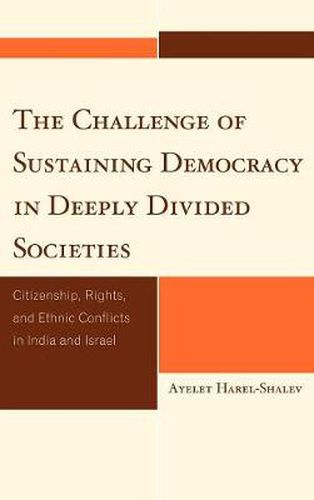Readings Newsletter
Become a Readings Member to make your shopping experience even easier.
Sign in or sign up for free!
You’re not far away from qualifying for FREE standard shipping within Australia
You’ve qualified for FREE standard shipping within Australia
The cart is loading…






In this book, Harel-Shalev analyzes public policy and governmental features in procedurally democratic states that govern deeply divided societies. The book traces the political formula that enables such states to survive while sustaining a democratic process in the face of religious, ethnic, and national conflicts. It investigates citizenship discourses, analyzes the mechanisms political regimes use to give rights to minorities while simultaneously limiting their power, and illustrates how this unique political formula can be applied in two case studies of vastly different countries-Israel and India. The analogous conflicts in India and Israel that threaten the survival of democracy-the ethno-religious conflict between Hindus and Muslims in India and the ethno-national conflict between Jews and Arab-Palestinians in Israel-are analyzed in depth. In addition, the core cases of India and Israel, states in which democracy has survived for over sixty years, are compared with two additional countries where democracy was short-lived. This issue is especially pertinent to the world today, as many young nations currently in the process of state building are coping with the challenges inherent in building democratic institutions in plural and polarized societies. The book explores the inherent tension between the conflicting logics of democracy, citizenship, and nation-state, and suggests enhanced tools for investigating societies in which this tension exists.
$9.00 standard shipping within Australia
FREE standard shipping within Australia for orders over $100.00
Express & International shipping calculated at checkout
In this book, Harel-Shalev analyzes public policy and governmental features in procedurally democratic states that govern deeply divided societies. The book traces the political formula that enables such states to survive while sustaining a democratic process in the face of religious, ethnic, and national conflicts. It investigates citizenship discourses, analyzes the mechanisms political regimes use to give rights to minorities while simultaneously limiting their power, and illustrates how this unique political formula can be applied in two case studies of vastly different countries-Israel and India. The analogous conflicts in India and Israel that threaten the survival of democracy-the ethno-religious conflict between Hindus and Muslims in India and the ethno-national conflict between Jews and Arab-Palestinians in Israel-are analyzed in depth. In addition, the core cases of India and Israel, states in which democracy has survived for over sixty years, are compared with two additional countries where democracy was short-lived. This issue is especially pertinent to the world today, as many young nations currently in the process of state building are coping with the challenges inherent in building democratic institutions in plural and polarized societies. The book explores the inherent tension between the conflicting logics of democracy, citizenship, and nation-state, and suggests enhanced tools for investigating societies in which this tension exists.